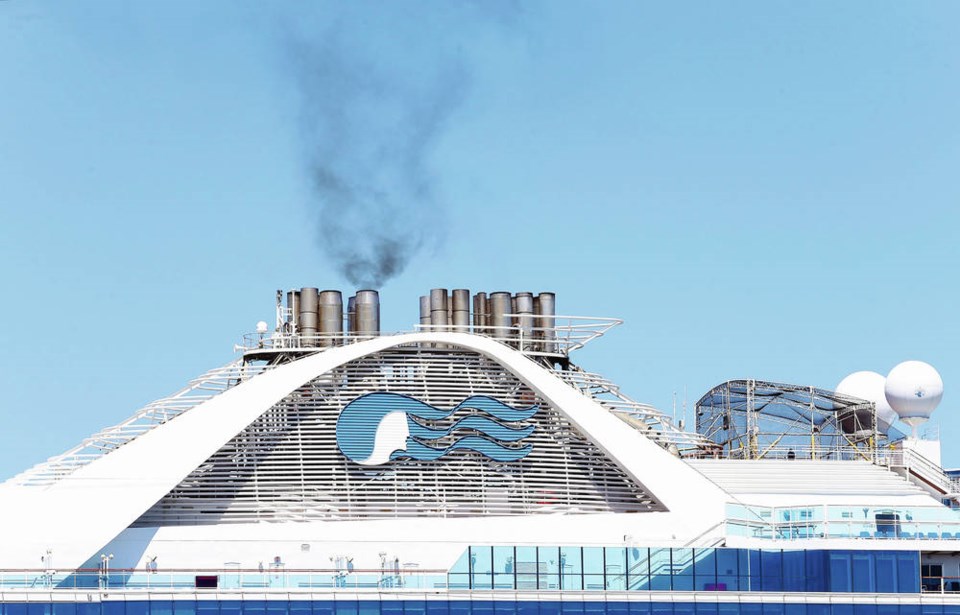A commentary by the president of the James Bay Neighbourhood Association.
Cruise ships will return to Victoria. With them will return hundreds of thousands of passengers and crew per year.
They will overwhelm residential streets with traffic as buses and taxis race to transport them to and from activities from early morning until midnight.
Once again, tonnes of cruise ship garbage will leave Ogden Point as large trucks filled with liquid and solid garbage, food waste, even hazardous waste, transit local streets on the way to the local landfill and beyond. Victoria has become the garbage dump for Seattle-Alaska cruises.
With the ships will return noxious fumes, clouds of brown smoke settling over James Bay and the legislature. And with them comes the threat of transmission of disease and virus into the local community.
Fair Sailing (fair-sailing.com, an initiative by the James Bay Neighbourhood Association) believes that the COVID-19 ban of cruise ship visits in Canada provides an opportunity to “rethink the restart” of cruise tourism.
We advocate for responsible cruise tourism practices that respect the interests of residents, local businesses and the environment of Victoria.
Cruise tourism has brought benefits to the local and regional economy, but it’s also brought significant negative environmental, health and social impacts, and unseen costs. Both resident quality of life and the quality of visitor experience have deteriorated unacceptably.
While tourism has been a welcome part of James Bay for more than 100 years, the unbridled growth of cruise tourism has altered this tourist-resident relationship. The number of ships increased from 34 in 1999 to 267 in 2019, with larger ships carrying more passengers, resulting in overcrowding of our community and increased traffic on local streets that were already at full capacity by 2015.
Cruise ships have a history of air pollution. The dark orange plume that rises from James Bay over the legislature during cruise season has been remarked upon by Mayor Lisa Helps.
Nitrous oxides and other compounds created by the burning of bunker fuel remain problems for many residents, and the ships generate greenhouse gases that significantly affect climate change.
Cruise ship waste materials offloaded at Ogden Point include solid wastes such as garbage, organics, hazardous wastes, recyclable goods, furniture and construction waste.
Liquid wastes may include blackwater (sewage), grey water (from sinks, showers, laundry), oily bilge water, hazardous liquids, and toxic scrubber waste.
Tens of thousands of tonnes of waste materials are transported by large industrial trucks through residential streets to Hartland landfill and various unknown locations on Vancouver Island and the mainland.
Accepting waste materials originating in another country is contrary to local and regional waste reduction goals. We say “no” to foreign garbage.
There is no such thing as safe cruising during any pandemic. COVID-19 has highlighted the role the cruise industry plays in the transmission of diseases and the need for clear rules and regulations to protect public health.
In 2020, the world watched as COVID-19 cases on the Diamond Princess rose to more than 700 and 13 people died while the ship was quarantined in Japan. There were 3,689 confirmed cases associated with 102 outbreaks on 124 ships by the end of September 2020.
Fair Sailing expects fully vaccinated requirements for passengers and crew arriving in Victoria and for the cruise industry to cover all local costs for accommodation, quarantine and medical treatment for passengers and crew in case of a shipborne outbreak, pandemic or epidemic.
The Fair Sailing website presents data-driven papers on overtourism, air pollution, foreign garbage and public health. Additional papers on air pollution monitoring, oceans and marine life, the cruise industry and B.C. ports provide context.
James Bay residents want quality of life, clean air, no foreign garbage and a healthy safe community. Fair Sailing says it is time to “rethink the restart” of cruise tourism in Victoria and advocates for mitigative strategies including shore power, daily caps on number of ships and passengers, alternative travel modes onshore, no foreign garbage and safeguards to our public health system.
We expect that the cruise industry “do no harm.”



